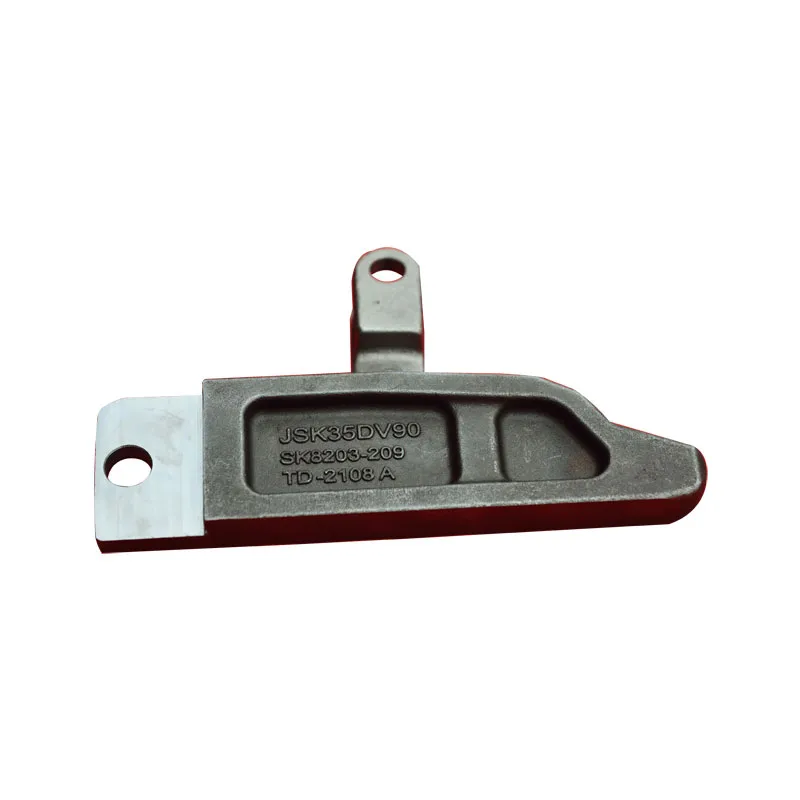Locking Hook Forgings: The Cornerstone of Secure Lifting and Towing Operations
2024-11-28
In industries where heavy lifting, rigging, and towing are commonplace, the need for secure, reliable connections is paramount. One critical component that plays an indispensable role in these operations is the locking hook forging. Whether in construction, marine transport, or heavy-duty industrial applications, locking hook forgings provide a combination of safety, efficiency, and durability, ensuring that connections remain secure even under extreme conditions. In this blog, we’ll explore the features, applications, and benefits of locking hook forgings and why they’re essential in today’s high-demand industries.
What Are Locking Hook Forgings?
A locking hook forging is a type of mechanical component used to securely attach loads, ropes, chains, or slings to heavy equipment during lifting, towing, or securing operations. The term "forging" refers to the process by which the hook is made. During forging, the material—usually high-strength steel or alloy—is shaped under high pressure, making the hook incredibly strong and resilient to wear and stress.
The defining feature of locking hook forgings is the integrated locking mechanism. This mechanism allows the hook to automatically secure itself once it’s engaged with another part of the rigging or equipment, preventing accidental release under load. This automatic locking action provides an extra layer of safety, making it ideal for high-stakes applications where failure could result in significant damage or injury.
Key Features of Locking Hook Forgings
1. Superior Strength and Durability:
One of the main advantages of locking hook forgings is their strength. Forging involves shaping metal through compressive forces, which increases its density and strength. As a result, locking hook forgings are capable of withstanding extremely heavy loads and high-stress conditions, which is essential in industries like construction and marine transport.
2. Automatic Locking Mechanism:
Unlike traditional hooks, which require manual locking or additional safety pins, locking hook forgings come equipped with a self-locking feature. Once the hook is connected to another piece of equipment (like a sling or chain), the locking mechanism engages automatically, preventing the hook from accidentally detaching during lifting or towing. This automatic action greatly enhances safety by reducing the risk of human error.
3. Corrosion Resistance:
Locking hook forgings are often treated with protective coatings, such as galvanization or made from corrosion-resistant alloys like stainless steel. This makes them ideal for use in marine environments or other outdoor conditions where exposure to moisture, salt, or chemicals can quickly degrade equipment.
4. Versatility:
Locking hook forgings come in a variety of sizes and configurations to accommodate different types of rigging, lifting equipment, and industrial tools. They can be used for a wide range of applications, from lifting heavy machinery to securing cargo for transport. Their versatility makes them a go-to component in many industries.
Applications of Locking Hook Forgings
1. Construction and Heavy Lifting:
In construction projects, cranes and other heavy lifting equipment require secure attachment points for moving large materials like steel beams, concrete blocks, and pipes. Locking hook forgings are used to fasten lifting slings and chains to these materials, ensuring that the load stays secure during hoisting. Their strength and automatic locking mechanism prevent the hook from releasing, even under extreme weight and stress.
2. Marine and Offshore Applications:
In the marine industry, locking hook forgings are critical for securing cargo, mooring lines, and even anchor chains to ships or offshore platforms. Saltwater and harsh weather conditions make corrosion a serious risk, but corrosion-resistant locking hook forgings ensure that connections remain intact, preventing cargo from shifting or becoming dislodged in rough seas.
3. Towing and Rigging:
Locking hook forgings are widely used in towing operations, particularly for heavy-duty vehicles, trucks, and machinery. When towing large vehicles or machinery, the automatic locking feature of the hook ensures that the tow is secure and prevents the risk of the hook disengaging while the load is in motion.
4. Agricultural Equipment:
Locking hook forgings are also used in agriculture, especially in machinery used for hauling trailers, carts, and harvesting equipment. Their reliable locking mechanism is essential in ensuring that heavy agricultural loads are securely fastened to tractors or other vehicles, reducing the likelihood of detachment during transportation.
Benefits of Locking Hook Forgings
1. Increased Safety:
The most obvious benefit of locking hook forgings is safety. With their automatic locking mechanism, these hooks ensure that connections cannot accidentally come loose during operation. This is particularly important in industries where heavy lifting or towing is common, as the risk of accidents and damage is significantly reduced.
2. Faster, More Efficient Operations:
The automatic locking feature eliminates the need for manual locking, safety pins, or additional fasteners. This reduces setup time and speeds up the process of securing loads, making operations more efficient. In high-paced environments like construction or maritime transport, efficiency is key to ensuring projects are completed on time.
3. Cost Savings:
While locking hook forgings may come with a higher initial cost compared to traditional hooks, their durability and long lifespan offer significant cost savings over time. These hooks are less likely to wear out or require frequent replacement, ultimately saving businesses money in the long run.
4. Reliability in Extreme Conditions:
Locking hook forgings are designed to handle heavy loads in harsh environments. Whether it’s extreme temperatures, corrosive saltwater, or high-stress situations, these hooks provide reliable performance, making them ideal for demanding industries like construction, marine, and agriculture.
Locking hook forgings are a vital component in industries that require secure, reliable connections during lifting, towing, or transporting heavy loads. Their combination of strength, durability, and automatic locking mechanisms makes them an essential part of modern industrial operations. Whether in construction, shipping, or agriculture, the safety and efficiency provided by locking hook forgings help ensure that projects are completed on time and without incident. By investing in high-quality locking hook forgings, industries can protect both their workforce and their bottom line.



